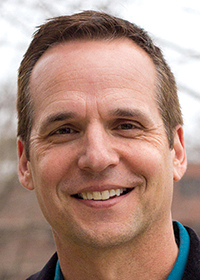Learn backwards, live forward
by December 22, 2024 12:16 pm 256 views

I can still remember learning to drive my first car. My newfound freedom changed everything. It was an exciting right of passage. Although driving equals freedom, the dangers of navigating a 4,000-pound machine through space are consequential.
In high school I was backing up my boat like ’65 Le Mans only to hear a loud crunch as I smashed into the car behind me. I was oblivious.
At that time, I probably thought the rearview mirror was better suited to maintaining my flowing 1980s mullet hairstyle. A driver cannot move forward by only looking through the windshield. Instead, young drivers must also grow comfortable looking in the rearview mirror.
Just like the driver, a leader must learn the balance of when to look forward and when to look backward. The leader who only looks through the windshield may not learn the critical lessons of the past. Conversely, the leader who only looks through the rearview mirror will never advance.
So how does a leader find this balance? The answer may exist in one simple yet profound insight from 19th-century Danish philosopher Søren Kierkegaard.

Kierkegaard is quoted as writing, “Life can only be understood backwards (rearview mirror); but it must be lived forward (windshield).” This is an invitation to deep reflection for leaders navigating the complexities of today’s fast-paced world. Kierkegaard’s words remind us that while we may only fully comprehend past experiences in hindsight, the future demands action and decision-making in the present. For leaders, this wisdom has profound implications. It challenges us to balance reflection with forward momentum, anchoring our decisions in lessons from the past while bravely advancing toward an uncertain future.
The challenge for any leader is finding the balance between reflecting on past experiences and living fully in the present. Too much focus on the past can lead to stagnation, where leaders become overly cautious or risk averse. On the other hand, neglecting to learn from the past can result in repeating the same mistakes or missing out on opportunities for improvement.
I recall a time when I was conducting a compliance audit at one of our field operations. I was a new manager looking to make a name for myself. In my zeal to discover errors, I completely dismissed the feelings and perceptions of the field operations team. Instead of asking questions to understand, I hunted for errors and failures. The individual with whom I worked at the site was livid. I neglected to consider her perspective. Eventually, she contacted my direct manager who then straightened me out quickly.
After that event, I was hesitant to critique or find any errors in future field office visits. I was spending too much time looking in the rearview mirror. Instead, I needed to learn from the past, avoid overcorrecting and look to the future.
A leader who has encountered failures in the past may find themselves overly focused on past mistakes, allowing them to drive future decisions from a place of fear or self-doubt. Alternatively, a leader who disregards the lessons of the past may repeat the same errors and fail to evolve in response to changing circumstances.
The key is to use reflection as a tool for informed decision-making while maintaining the courage and focus to take decisive action toward future goals. Kierkegaard’s quote offers a poignant reminder to leaders: understanding comes through reflection, but action must always be oriented toward the future.
Editor’s note: Erik Dees, Ph.D., is a partner with Milestone Leadership. Milestone Leadership’s Mission is to build leaders worth following. The opinions expressed are those of the author.
